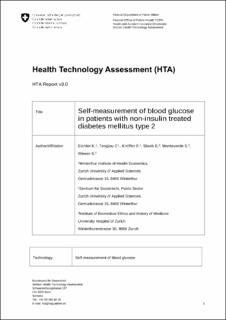Bitte benutzen Sie diese Kennung, um auf die Ressource zu verweisen:
https://doi.org/10.21256/zhaw-19405| Publikationstyp: | Working Paper – Gutachten – Studie |
| Titel: | Health technology assessment : self-measurement of blood glucose in patients with non-insulin treated diabetes mellitus type 2 |
| Autor/-in: | Eichler, Klaus Tzogiou, Christina Knöfler, Fabio Slavik, Eva Monteverde, Settimio Wieser, Simon |
| et. al: | No |
| DOI: | 10.21256/zhaw-19405 |
| Umfang: | 142 |
| Erscheinungsdatum: | 2019 |
| Verlag / Hrsg. Institution: | Bundesamt für Gesundheit |
| Sprache: | Englisch |
| Fachgebiet (DDC): | 362: Gesundheits- und Sozialdienste |
| Zusammenfassung: | Background: The value of SMBG in non-insulin treated T2DM patients is unclear. We performed a full-HTA to assess patient benefit and cost-effectiveness, as well as ethical and socio-legal aspects of SMBG. Research question: What is the effect on HbA1c and cost-effectiveness of adding SMBG to usual care in adult non-insulin treated T2DM compared to usual care without SMBG? Methods: We performed literature searches, quantitative and qualitative evidence synthesis. For our economic analysis we used a diabetes simulation modelling approach (UKPDS-OM2). Results: We retrieved 2,882 records and included 24 RCTs and 10 economic studies. Comparing several SMBG protocols of the intervention groups with no, less frequent or less struc-tured SMBG leads to a statistically significant HbA1c decrease of -0.29%-points (95%CI: -0.40 to -0.18; 23 RCT; low certainty of evidence). Based on our model, this HbA1c decrease translates into small but statistically significant reductions in several diabetes related complications. SMBG leads to a modelled increase in life expectancy of 18 days (95%-CI: 13 to 25) with increased total costs of CHF 2,910 (95%-CI: 2,750 to 3,021) over a time horizon of 40 years. Based on this small health benefit and on the low total additional costs, SMBG has a formal ICER of CHF 65,023 per QALY gained. In studies without any SMBG in the control group, the HbA1c decrease is more pronounced (-0.33%-points; 95%CI: -0.45 to -0.21; 17 RCT). SMBG is more cost-effective with the ICER decreasing to CHF 41,078 per QALY gained. SMBG was associated with a significantly increased probability of detecting hypoglycaemia (RR 2.10; 95%-CI: 1.41 to 3.15; 4 RCTs with high proportions of patients treated with sulfonylureas; episodes of mild and non-severe nature; moderate quality of evidence). SMBG increases the prob-ability of «being in HbA1c target» (RR 2.78; 95%-CI: 1.46 to 5.31; 5 RCTs; low quality of evidence). No relevant differences were seen in the RCTs for psychological outcomes (e.g. depressive symp-toms, quality of life, patient satisfaction with treatment [moderate to high certainty evidence]), mor-bidity, mortality, and unexpected events and harms [low certainty of evidence]). Only 1 in 4 non-insulin treated patients with T2DM in Switzerland bought SMBG test strips in 2017 and most of those buying test strips bought substantially less than the maximum amount reimbursed. A total elimination of test strip coverage for non-insulin treated T2DM patients would lead to net savings of CHF 6.09 million per year (budget impact) from a Swiss healthcare payers’ perspective. Organisational issues of relevance are proper documentation of SMBG results by patients (possibly supported by smartphone applications) and adequate handling of SMBG by vulnerable groups (e.g. elderly persons with visual dysfunction or limited motor skills). From a socio-legal perspective, re-stricting the provision of blood glucose test strips to a certain group of patients must be based on objective reasons (WZW criteria on the basis of the HTA), but may under no circumstances be unilaterally at the expense of vulnerable groups. From an ethical perspective, the evidence base to question current best practices appears to be scant: SMBG is associated with a slight improvement of HbA1c levels, but it is unclear to which extent this result is also clinically relevant. At a psycho-logical level, SMBG allows a higher degree of participation of patients in the care process, but there is no clear evidence about improved psychological outcomes in the target population. Conclusions: SMBG shows modest efficacy on HbA1c levels in RCTs. Model calculations based on this finding suggest a resulting small increase in life expectancy. However, since this has so far not been evaluated in clinical studies, this outcome cannot be confirmed nor rebutted. |
| URI: | https://www.bag.admin.ch/dam/bag/de/dokumente/kuv-leistungen/bezeichnung-der-leistungen/Re-Evaluation-HTA/self-measurement-of-blood-glucose-in-patients-with-non-insulin-treated-diabetes-mellitus-type-2.pdf https://digitalcollection.zhaw.ch/handle/11475/19405 |
| Lizenz (gemäss Verlagsvertrag): | Lizenz gemäss Verlagsvertrag |
| Departement: | School of Management and Law |
| Organisationseinheit: | Winterthurer Institut für Gesundheitsökonomie (WIG) |
| Enthalten in den Sammlungen: | Publikationen School of Management and Law |
Dateien zu dieser Ressource:
| Datei | Beschreibung | Größe | Format | |
|---|---|---|---|---|
| 2019_BAG_HTA-Report_self-measurement.pdf | 2.37 MB | Adobe PDF |  Öffnen/Anzeigen |
Zur Langanzeige
Eichler, K., Tzogiou, C., Knöfler, F., Slavik, E., Monteverde, S., & Wieser, S. (2019). Health technology assessment : self-measurement of blood glucose in patients with non-insulin treated diabetes mellitus type 2. Bundesamt für Gesundheit. https://doi.org/10.21256/zhaw-19405
Eichler, K. et al. (2019) Health technology assessment : self-measurement of blood glucose in patients with non-insulin treated diabetes mellitus type 2. Bundesamt für Gesundheit. Available at: https://doi.org/10.21256/zhaw-19405.
K. Eichler, C. Tzogiou, F. Knöfler, E. Slavik, S. Monteverde, and S. Wieser, “Health technology assessment : self-measurement of blood glucose in patients with non-insulin treated diabetes mellitus type 2,” Bundesamt für Gesundheit, 2019. doi: 10.21256/zhaw-19405.
EICHLER, Klaus, Christina TZOGIOU, Fabio KNÖFLER, Eva SLAVIK, Settimio MONTEVERDE und Simon WIESER, 2019. Health technology assessment : self-measurement of blood glucose in patients with non-insulin treated diabetes mellitus type 2 [online]. Bundesamt für Gesundheit. Verfügbar unter: https://www.bag.admin.ch/dam/bag/de/dokumente/kuv-leistungen/bezeichnung-der-leistungen/Re-Evaluation-HTA/self-measurement-of-blood-glucose-in-patients-with-non-insulin-treated-diabetes-mellitus-type-2.pdf
Eichler, Klaus, Christina Tzogiou, Fabio Knöfler, Eva Slavik, Settimio Monteverde, and Simon Wieser. 2019. “Health Technology Assessment : Self-Measurement of Blood Glucose in Patients with Non-Insulin Treated Diabetes Mellitus Type 2.” Bundesamt für Gesundheit. https://doi.org/10.21256/zhaw-19405.
Eichler, Klaus, et al. Health Technology Assessment : Self-Measurement of Blood Glucose in Patients with Non-Insulin Treated Diabetes Mellitus Type 2. Bundesamt für Gesundheit, 2019, https://doi.org/10.21256/zhaw-19405.
Alle Ressourcen in diesem Repository sind urheberrechtlich geschützt, soweit nicht anderweitig angezeigt.